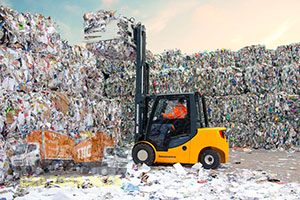Have you ever wondered where does rubbish end up after a waste clearance service for example? Well that depends on the type of waste being cleared away. In the last two decades waste clearance, disposal and processing options have multiplied with new waste management solutions becoming available.
For example, say you were clearing away garden rubbish – this is considered green waste and can be disposed of easily as it doesn’t pose an environmental risk. Many waste removal companies give green waste for composting to special facilities, sometimes processed green waste goes into the making of natural fertilisers, animal feed, soil revival products etc. General household rubbish, including kitchen waste is processed in a different way. Although organic, general household waste must be disposed of in special treatment facilities. Until a few years ago, landfills were the preferred way to deal with such waste as dumping, compacting and burying is relatively cheaper and easier than other methods. However, landfills fill up eventually which means more land needs to be sacrificed in favour of new rubbish tips. Furthermore, landfills tend to poison and pollute soil and water which is a serious environmental problem. Rubbish collected during the waste removal can also be taken to recycling plants – reusable materials like plastics, metals, glass, paper and some others can be processed into new raw materials used by the industry. Recycling does have a downside though – certain materials require lots of energy to be processed – energy that needs to be generated in some way.
Until a few years ago, landfills were the preferred way to deal with such waste as dumping, compacting and burying is relatively cheaper and easier than other methods. However, landfills fill up eventually which means more land needs to be sacrificed in favour of new rubbish tips. Furthermore, landfills tend to poison and pollute soil and water which is a serious environmental problem. Rubbish collected during the waste removal can also be taken to recycling plants – reusable materials like plastics, metals, glass, paper and some others can be processed into new raw materials used by the industry. Recycling does have a downside though – certain materials require lots of energy to be processed – energy that needs to be generated in some way.
Another way to dispose of certain types of rubbish, including some hazardous waste is incineration. Rubbish incinerators have been in operation in the UK for a period of time now, and there are more in the making. Burning waste creates pollution though, gasses and fumes are of course filtered or reduced in special ways before being pumped out in the atmosphere, but they still create environmental pollution. This is perhaps the main reason why waste incinerators are meeting such strong resistance and disapproval from UK environmental groups.
One of the ways to reduce overall pollution is to minimise the residue so to speak left from processing or recycling materials, this of course would require innovative processing solutions. Another way to reduce pollution is to increase the use and application of easily recyclable products. Some countries are considering dual use products or implementation of policies that require people to use only recyclable products. These are all steps in the right direction, but so far there has been no universal solution to the waste management problem faced by many countries around the world. The consumer society concept also has a negative effect as reduction of unnecessary use i.e. waste will in turn reduce environmental pollution.



